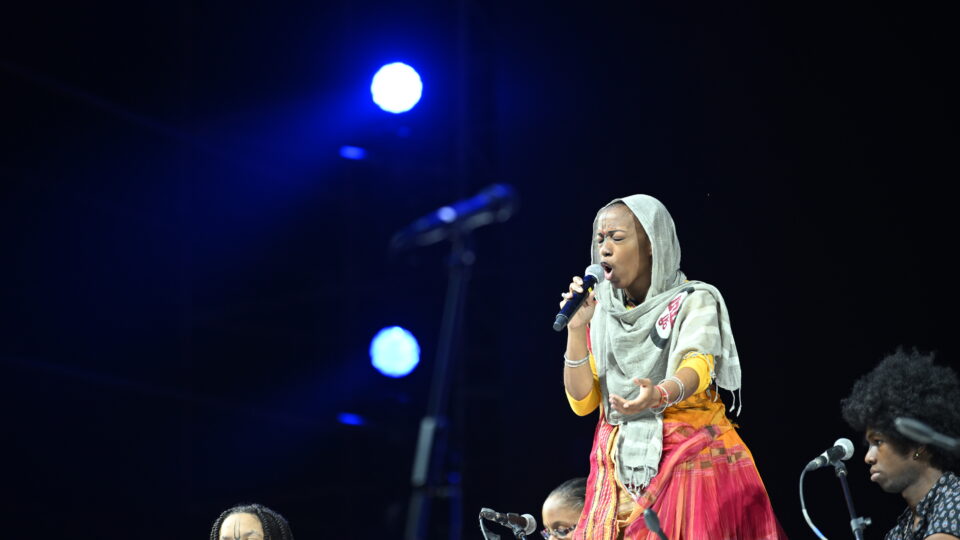In India’s sprawling music ecosystem, devotional music remains one of the most popular genres, with spiritual songs and chants getting billions of views on platforms like YouTube and Spotify. Its appeal now stretches far beyond temple courtyards and festival gatherings, and into headphones, playlists, and global concert stages.
Acyuta Gopi, a Grammy-nominated contemporary kirtan singer, sees this moment as both an evolution and a return. “Kirtan is not a gimmick. It’s not a trend. It’s the real calling of the heart,” she says. “It takes the youth back to their roots and creates a space where everyone—regardless of background—can sing together.”
The Brooklyn-based Acyuta Gopi wants to lead a new chapter for the form. Her voice is steeped in the discipline of traditional kirtan, yet her audience is global, spanning listeners who connect with the emotional weight of her music regardless of its devotional origins. She distinguishes her kirtan gatherings with a storyteller’s touch, often interspersing her singing with stories of the divine that explore the triumph of virtue over vice, the rewards of courage and devotion, and the importance of humility, loyalty, and selflessness.
Gopi’s journey began in an immersive world of everyday devotional practice. Born in New York to parents who practiced Krishna consciousness, her mornings were filled with the sound of temple bells, the chime of kartals, and the scent of incense. But over time, she realized that the music she grew up around could resonate well beyond the spaces she first encountered it.
Gopi recalls performing at the Polish Woodstock Festival, where hundreds of thousands came to watch mainstream music acts. Yet, she says, attendees found themselves drawn to the Krishna Village of Peace, a program established by ISKCON devotees at the festival to create a space for peace and restoration at the festival. “We didn’t speak the same language, but in kirtan we understood each other completely,” she says, pointing to its impact.
The journey of devotional music has mirrored India’s own technological shifts: from oral traditions and live bhajans to cassette tapes in the 1980s, devotional TV programming in the 1990s, and now high-quality livestreams and algorithm-curated recommendations. Yet, for Gopi, this digital accessibility hasn’t diminished the music’s core. “Technology can help serve the aim, but the goal is to create a lasting impression in the heart,” she says. “The next big trend will come and go. People will still look for peace for the soul.”
In recent years, the definition of “spiritual music” has expanded. AI-generated “spiritual” rock bands and techno tracks tuned to healing frequencies have entered the market. But Gopi doesn’t see these as signs of concern. “AI doesn’t have the magic of the soul. Devotional music is about love, and people can feel the difference between something made from the heart and something generated.”
Part of the genre’s enduring power, she says, lies in its accessibility. There are no ticket prices or membership requirements, and there is no specific date on the calendar when participation is “allowed.” In her words: “You can step into kirtan as one person and leave as another—lighter, more at peace, with answers you didn’t even know you were searching for.”
In February this year, she held her first spiritual concert under the Chal Mann Vrindavan banner in Gujarat’s Gandhinagar. Now, she is embarking on a nationwide tour spanning Hyderabad, Bangalore, Jaipur, Delhi, Pune, Mumbai, and more. This is also part of a rising wave of meditative concert experiences in the country, with artists like Rishab Rikhiram Sharma and Janhavi Harrison also bringing more reflective, soulful performances to live audiences.
“Carrying a legacy of devotion is a big responsibility,” she admits. “Simply following in the footsteps of great saints who understood what works in terms of creating a devotional life for oneself means that I don’t have to transform anything as much as one would think. I usually take it as my mission to remind today’s generations that this spirituality has always been there waiting for them.”
















Leave a Reply